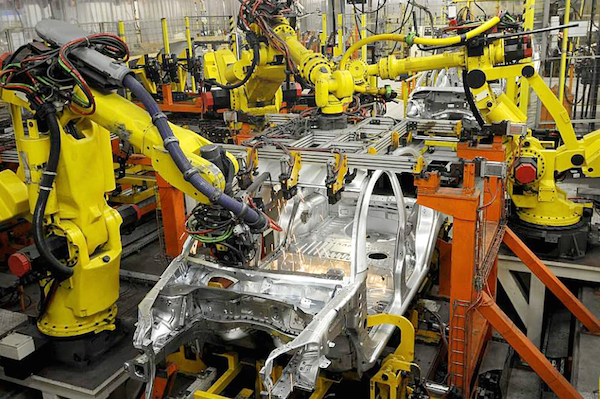Martin Ford, the technology expert whose 2016 book Rise of the Robots woke up a lot of people to the automation risk, is continuing to speak to audiences warning them about the threat of a jobless future.
He recently spoke in Armenia to discuss the topic as described below — but perhaps he should be rattling some cages in America’s capitol city where awareness of coming technological job loss is near zero. One obvious point: it makes no sense to continue admitting thousands of unskilled illegal aliens from the south when there will be no jobs for them at all when automation hits hard in a few years.
Human workers have largely disappeared from some manufacturing floors after being replaced by robots.

Ford remarked in a recent tweet that the Star’s headline “is a bit over the top” but he did not deny that a severe economic disruption is likely.
Robots to end manual labour and put half of world out of work in global crisis, Daily Star (UK), October 7, 2019
Artificial intelligence will soon be widespread in the workforce
Robots will make half of the world’s workforce redundant in the next 10 to 20 years in a global unemployment crisis, an AI expert has claimed.
Top US futurist Martin Ford said automaton will soon be widespread, with all low-skilled jobs replaced by robots.
Ford, who focuses on the impact of AI and robotics on the job market, warned we need to be ready for widespread global unemployment.
He acknowledges the “long record of false alarms,” but argues that this time is different.
The pace of automation, he says, is no longer linear, but exponential, like the growth in computing capacity predicted by Moore’s Law.
The economy, Ford says, will not have time to create new professions to absorb the tens of millions of workers displaced by automation.
“My primary concern is that as AI and machine learning and robotics advance, a huge fraction of the jobs and tasks currently performed in the economy are going to be susceptible to automation,” he told the World Congress on Information Technology in Armenia today.
“Primarily it’s going to be those types of roles that are fundamentally routine, repetitive and, to some extent, predictable.
“That could be jobs in factories, but it could also be white collar jobs, the kind of job where you’re sitting in front of the computer doing something relatively routine - perhaps producing the same report again and again.”
White-collar jobs are also at risk for the first time, Ford says. On Wall Street, the number of financial workers has already plunged by 50,000 since 2000, as computers can process 100,000 transactions in a tenth of a second. (Continues)